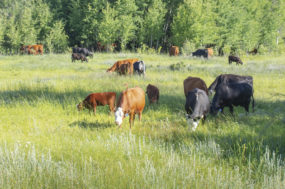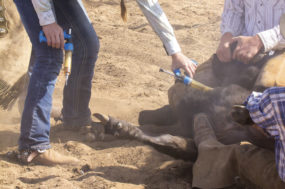Farmers subscribe to newspapers and magazines to get turned on by old tractors, while ranchers lust after good bulls they see in advertisements.
It’s odd; cattlemen love to buy horses at auction, but it’s the farmers who care more about horsepower when bidding.
The farmer’s home and barn is apt to be wallpapered in old flyers, sale bills and big girlie calendars advertising wrenches, but if the dining room table is covered in bull sale catalogues, there probably isn’t a combine, compressor or a pair of bib overalls on the place.
Once they are at the auction, the farmer is apt to interrupt the auctioneer by asking, “How many hours on the tractor?,” whereas a rancher might ask, “Does she have any teeth left in her head?”
A farmer wants to know, “Can you start it up?” A cattleman is curious, “Who’s she bred to?” Both want to know if the lot they are buying has any gas left in its tank, so to speak.
A cattleman takes his gooseneck to the sale while a farmer takes his flatbed. They are both looking to buy something at the auction they can buy cheap and nurse back to health.
At the end of the farm sale there’s lots of heavy lifting to do, even if the management makes a loader available. Cattle at a sale barn will pretty much load themselves.
The only reason a rancher subscribes to Dish or Direct TV is to watch the monthly cattle video sales, while the farmer watches shows about old tractors on RFD.
The proudest moment for a rancher is getting his name listed in the representative sales column of the local sale barn or having his picture taken with the high-selling lot at a bull sale.
The proudest moment that an auction-loving farmer could possibly have would be if the producer from that show on TV about hoarding called and said they wanted to do a one-hour special on his “collection” of rusty relics, or if Frank and Mike from “American Pickers” made a cold call after seeing the farmer’s junk pile from the road.
A farm auctiongoer has probably bought several pallets of assorted rust just to get one old tractor seat from an International Harvester, while a rancher, more than once, has bought a bull just because he felt guilty eating the free barbecue.
At least one farmer every sale will try to leave a few pallets of junk behind after cherry-picking what he wanted, while a rancher will often ask the auctioneer if he can “take one out” of the cattle in the sale ring.
Bull sale attendees eat better than those at farm estate sales. The farmer pays to eat out of a truck, while the rancher dines on the best beef for free.
There’s a good reason for this: The rancher is trying to get the cattleman’s repeat business by serving a good meal, while the farmer doesn’t care because he’s either dead or on his way to Arizona to retire and play golf.
I’ve often seen a rancher bring a pillow or a donut to sit on during a long sale, but the farmer is more concerned about a comfortable pair of boots to walk up and down the rows of farm implements.
When he buys something, the farmer holds up a card with his buyer number on it, while a bull sale is far more personal and the auctioneer might call out the ranch or the buyer’s name, even if it is fictitious.
Ranchers often mix business with pleasure by bringing their wives along, while farmers mix business and pleasure by leaving theirs at home.
For the ranch wife, the bull sale might be her only “vacation” of the entire year. Ditto the farm wife when her husband leaves the house.
On the tombstone of the farm sale devotee are the words, “Going, going, gone.” The epitaph of the auction-going rancher reads, “Out the gate and down the alley.” ![]()








